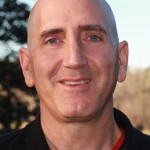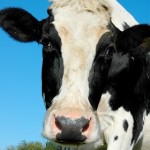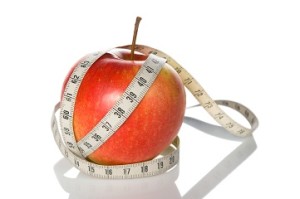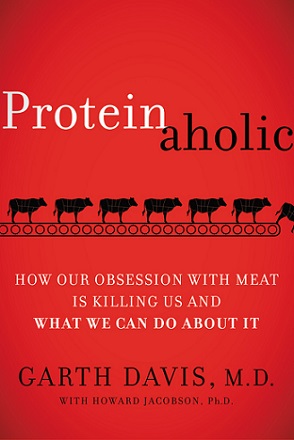Dr. Garth Davis Shows That What You Don’t Know About Protein May Be Killing You
The title of Proteinaholic captivated me, so I immersed myself in this book as soon as I could get hold of it. Proteinaholic lives up to its title, busting the dangerous myth that, when it comes to protein, more is better. This is a rich, multi-faceted book that effectively uses several strategies to document the hazards of high protein animal foods.
Proteinaholic paints the evidence-based nutritional picture in its glorious complexity. Yet even with all the science, the book is marvelously written, easy to understand and a pleasure to read. Proteinaholic generates excitement by directly attacking the protein myth at the center of American nutrition, a position few are willing to take.
The author, Garth Davis, MD, shares his own story of deteriorating health and
weight gain with high protein meals. He vividly describes his experience of “hitting bottom.” This desperation, paradoxically, was a good thing – opening his mind to question the real effect of eating animal foods multiple times a day. Dr. Davis began to spend every spare moment researching scientific studies to find the hidden truth about nutrition and health.
Dr. Davis lets you know what healthy people around the world actually eat (hint: it’s not animal foods) and what happens when they change their menu. He runs through
what researchers have found on common medical conditions, including cancer, heart disease, and obesity. Descriptions of typical patient encounters and conversations liven the facts. Dr. Davis even guides you in how to evaluate research yourself, so you are not hoodwinked by shallow journalism and food industry distortions.
Dr. Davis shares several strategies to transform how you think about food, so that changes in how you eat become sustainable and enjoyable. Can you imagine being repulsed by your favorite animal food recipe? Follow the tips in Proteinaholic and you may be delighted to find this happening as your tastes change course to healthy.
While Dr. Davis is a busy, popular bariatric surgeon, I was able to grab a few minutes of his time to ask him more about the book. The question I most wanted to know more about is what makes some patients successful in switching to a plant-based diet, while others languish on the same diet that’s made them so sick. “There are several factors,” Dr. Davis shared. “We live in a culture of extremes. If people go abruptly from virtually no fiber in their diet to sixty grams of fiber in a day, they will feel sick and decide a plant-based diet is not for them. Then there is the social aspect of eating, and the relative scarcity of healthy options in many restaurants. Most important, people need to be willing to change their tastes. If they spend all their time craving cheeseburgers, sooner or later they will give in because they are unhappy. You can learn to love and crave healthy foods, but it takes some focused

Howard Jacobson, Ph.D., also played a key role in writing Proteinaholic and making it so reader-friendly
effort.”
I asked Dr. Davis what it will take to make most Americans realize that protein is the emperor who has no clothes. “Successful dieters are ads for better food choices. So

Dr. Davis shares that understanding how animals suffer when raised and killed for food helped him stay on track and change his food preferences to healthy
are plant-based athletes. They are building the realization that meat is not good for you. How people look at food is evolving. There is also a frightening awareness of how food affects the environment,” he thoughtfully replied. “The problem with the current nutritional recommendations is that they are based on macronutrients – protein, fat, and carbohydrate. The recommendations should be built on specific foods. The way it’s set up now, carbs and fats bicker about which is worse, while protein rises to the top as undisputed king. This keeps people from making healthy food choices, and Proteinaholic is aimed at dispelling this ludicrous approach to telling people what to eat.”
Yes, Americans are obsessed with “protein, protein, protein,” living (and dying) with the false idea that protein is a premier, magical nutrient that should be the center of any diet. Proteinaholic

This is an apple, not a “carb.” Learn to think in terms of whole foods to be permanently successful with weight loss
demonstrates that the human diet needs to be built on a solid foundation of whole plant foods, not the trendy quicksand of “protein.”
If you enjoyed this post, you may want to read more about why plants are the base of the food chain for just about all nutrients.
Intrigued? Now you can use our Whole Foods Blog Finder to target informative, fun postings on whole foods, plant-based diets. Quick information at no cost!
Blog posting written by Janice Stanger, Ph.D. Janice authored The Perfect Formula Diet: How to Lose Weight and Get Healthy Now With Six Kinds of Whole Foods. This book also has eye-opening information on protein myths, the major role that foreign animal proteins have in igniting the inflammation that underlies most chronic illness, and a healthy plant-based eating plan.
Tags: carbohydrates, Dr. Garth Davis, Howard Jacobson, protein, Proteinaholic, weight loss






